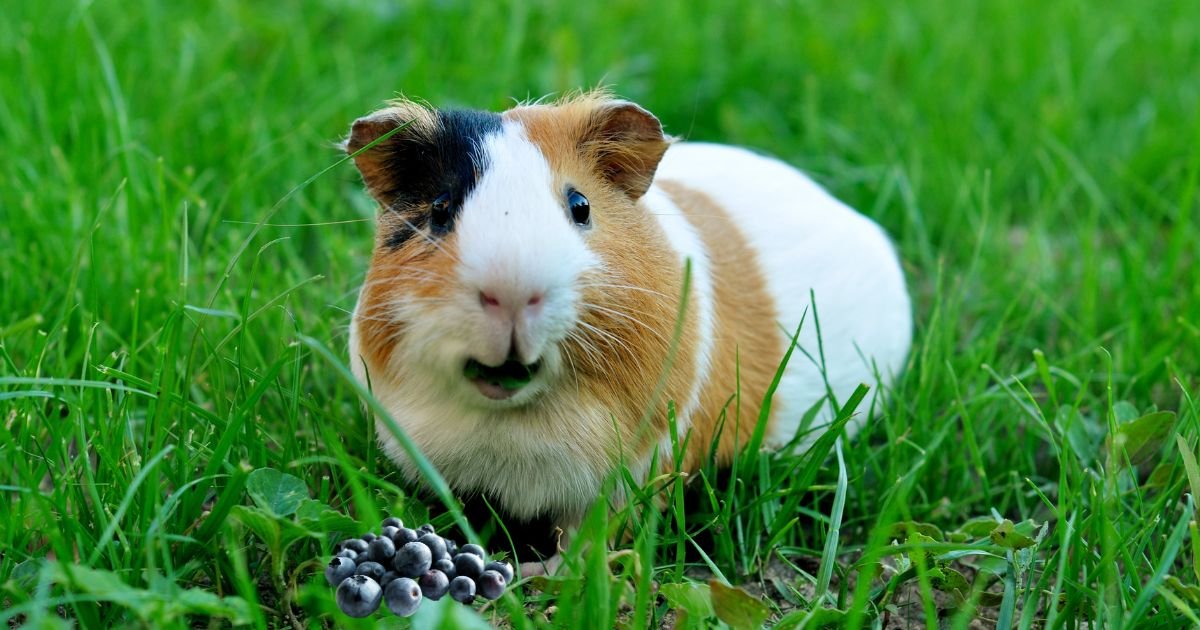Introduction
Animal enthusiasts like the cute and friendly creatures known as guinea pigs. They eat a range of fruits and vegetables since they are herbivores. But, as a responsible pet owner, you must know what foods are safe for them and what to avoid. Whether or whether their pet can eat blueberries is a frequent query among guinea pig owners.
In this article, we will answer this question and provide all the information you need to know about feeding blueberries to your guinea pig.
Blueberries make for a sweet, tasty snack that humans love to enjoy. But can our furry little guinea pig friends also partake in this delicious fruit? Blueberries have some nutritional benefits but also have potential risks for guinea pigs. Read on to learn everything you need to know before feeding blueberries to your cavies!
Read More: Can Rabbits Eat Cabbage
Can Guinea Pigs Eat Blueberries?
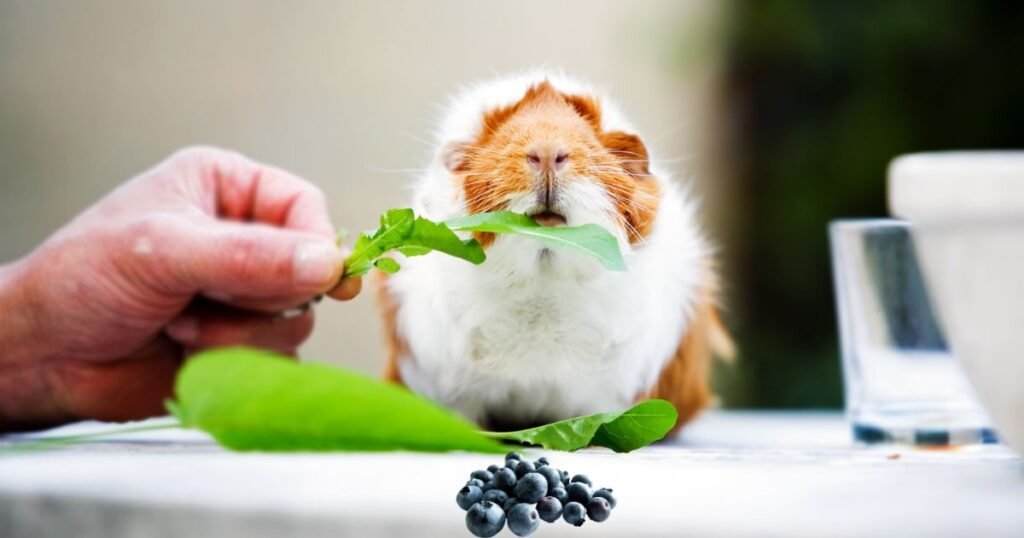
Yes, guinea pigs can eat blueberries, to put it simply. Blueberries are a healthy and nutritious fruit rich in antioxidants, vitamins, and fiber, providing many health benefits for your pet. However, feeding them in moderation and the right way is essential.
Here are some essential things to keep in mind when feeding blueberries to your guinea pig:
- Portion Size: Blueberries are high in sugar; this may cause diabetes and obesity in guinea pigs, among other health issues. It is crucial to feed them in moderation as a result. A few blueberries a week would be perfect for your furry friend.
- Preparation: Before feeding blueberries to your guinea pig, carefully wash them with clean water to get rid of any pesticides or chemicals. You can cut them into small pieces to make eating easier for your guinea pig.
- Feeding Frequency: Blueberries should not be a regular part of your guinea pig’s diet. Once or twice a week, as a treat, you may feed them. But it should not be their primary food source.
- Other Fruits and Vegetables: Blueberries should be given as a part of a varied and balanced diet. Other fruits and vegetables, such as apples, bananas, carrots, and spinach, may also be given to your guinea pig.
Read More: Can Rabbits Eat Oranges
Nutritional Value of Blueberries for Guinea Pigs
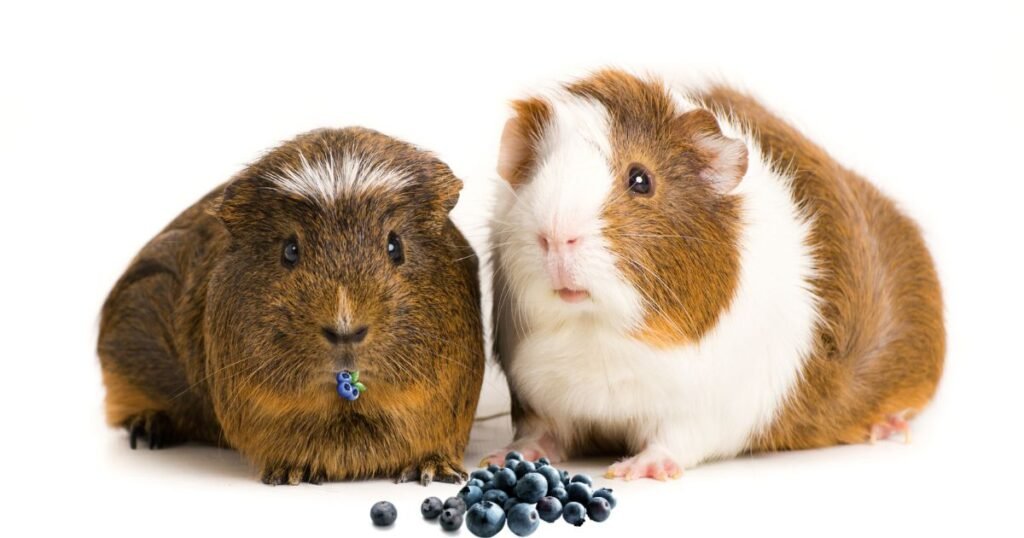
| Nutrient | Amount |
| Calories | 57 kcal |
| Protein | 0.74 g |
| Fat | 0.33 g |
| Carbohydrate | 14.5 g |
| Sugar | 9.96 g |
| Fiber | 2.4 g |
| Vitamin C | 9.7 mg |
| Calcium | 6 mg |
| Phosphorus | 12 mg |
| Magnesium | 6 mg |
| Potassium | 77 mg |
| Vitamin A | 54 IU |
| Vitamin K | 19.3 µg |
Benefits of Feeding Blueberries to Guinea Pigs
Feeding blueberries to your guinea pig can provide many health benefits, including:
- Antioxidants: Antioxidants found in abundance in Blueberries may lessen the risk of acquiring chronic diseases and prevent cell deterioration.
- Vitamins: Blueberries contain vitamins C, K, and B6, essential for your guinea pig’s health and well-being.
- Fiber: Fiber from blueberries may help to support a healthy digestive system and ward against digestive issues.
- Hydration: Blueberries are high in water content, which can help keep your guinea pig hydrated.
Diet of Guinea Pigs

First, let’s go over the typical dietary needs of guinea pigs to understand better how blueberries may fit in. Since they are herbivores, Guinea pigs do not consume animal products, so they only eat plant materials. A guinea pig’s central portion should be fresh timothy hay, which provides the fiber needed for digestion and dental health.
Guinea pigs also need a regular portion of fresh veggies and limited fruits. Leafy greens like kale, spinach, and romaine lettuce make excellent daily veggie choices. Fruits can be fed sparingly as a treat a few times per week. Some favorites are strawberries, melon, mango, and apple slices. Always introduce new foods slowly to monitor for allergies.
Finally, guinea pigs require a supplement pellet made especially for cavies to ensure they get critical vitamins like vitamin C. Access to clean and fresh water is also essential. Following this balanced diet will keep your furry friend healthy. Now, how might blueberries factor in?
Read More: Can Rabbits Eat Blueberries
Health Benefits of Blueberries
When consumed in moderation and on occasion, blueberries provide the following significant health advantages:
- Vitamin C – Like humans, guinea pigs cannot make their own vitamin C. Blueberries provide a decent dose of this crucial vitamin.
- Antioxidants – The anthocyanins and polyphenols in blueberries act as antioxidants to combat cell damage.
- Vitamin K – Necessary for blood clotting, vitamin K is found in blueberries.
- Fiber – The skin of blueberries contains fiber to support digestion.
In summary, the main positives of blueberries are providing some essential vitamins, antioxidants, and fiber. This makes them an arguably better fruit choice than sugary options like grapes.
Health Concerns of Blueberries

However, there are also some potential downsides to consider before feeding blueberries:
- Sugar content – Blueberries contain natural sugars that can be unhealthy in large amounts.
- Acidity – Like most berries, blueberries have an acidic pH that may bother some guinea pigs.
- Choking risk – The small size of blueberries presents a choking hazard for guinea pigs.
- Diarrhea – Too many blueberries may loosen stools or cause diarrhea.
While blueberries are relatively low risk compared to fruits like oranges, they do still carry some possible health concerns. Portion control and proper preparations are crucial to safety.
How Many Blueberries Are Okay?
When feeding blueberries to your guinea pig, follow these portion guidelines:
- Limit to 1-2 times per week as an occasional treat.
- Always mix in with other fruits/veggies to prevent overeating.
- Start with just 1-3 berries at first to monitor reactions.
- Gradually increase serving size from 5 up to 10 berries max.
- Provide up to 10-15 % of daily calories from fruit sources.
Following these suggestions will allow your guinea pigs to enjoy blueberries safely. The serving size should still make up only a tiny fraction of their overall food for the day.
The Advantages & Disadvantages

The main advantages and disadvantages of serving blueberries are listed below:
Advantages
- It contains beneficial vitamins and minerals
- Provides antioxidants to support health
- Adds variety to your guinea pig’s diet
Disadvantages
- High in natural sugar content
- Potential for diarrhea or upset stomach
- Small size poses the risk of choking
- Too much may lead to obesity
Overall, the advantages outweigh the risks as long as proper portions are provided. But any cons of blueberries can be avoided with responsible feeding practices.
Appropriate Serving Size and Preparations
Follow these tips for serving blueberries safely:
- Wash thoroughly right before serving to remove any pesticides.
- Chop larger berries into smaller pieces to minimize choking hazards.
- Mix into a salad with leafy greens and other chopped veggies.
- Offer in moderation along with timothy hay and pellets.
- Introduce slowly at first to watch for individual reactions.
- Discontinue feeding if you notice adverse effects.
With proper preparations and reasonable serving sizes, blueberries supplement a balanced, cavy diet.
Benefits of Feeding Blueberries to Guinea Pigs
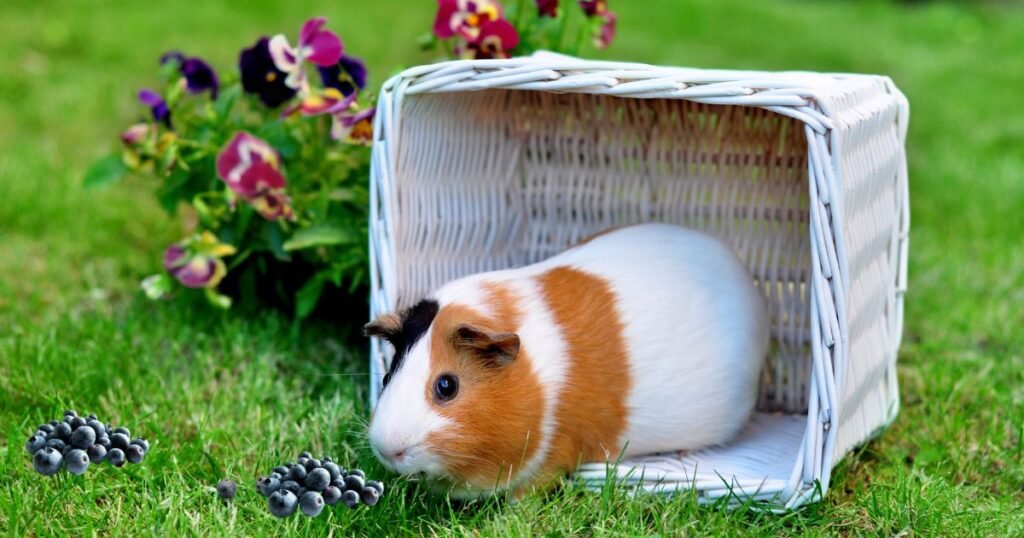
Now that we’ve covered the fundamentals let’s dive deeper into why blueberries can be a healthy treat in moderation.
Blueberries Are Packed With Vitamins and Minerals
Though minor, blueberries contain significant amounts of crucial micronutrients:
- Vitamin C – A single blueberry provides around 2 mg of vitamin C. Blueberries can contribute to this since guinea pigs need 10-30 mg daily.
- Vitamin K – Necessary for blood clotting, blueberries supply about 19% DV of vitamin K per cup.
- Manganese – Blueberries have over 20% DV of manganese, which aids bone health.
In addition to these, blueberries provide smaller amounts of vitamin E, magnesium, and phosphorus. The vitamins and minerals make them more nutritious than sugary fruits.
Blueberries Are Extremely Antioxidant Rich
Antioxidants protect against oxidative damage from free radicals and inflammation. Due to various components, blueberries have one of the most significant antioxidant capabilities among all fruits.
- Anthocyanins – This antioxidant pigment gives blueberries their color. It supports heart health.
- Polyphenols – Unique polyphenols like resveratrol and quercetin neutralize free radicals.
- Vitamin C – A core antioxidant, vitamin C is abundant in blueberries.
- Carotenoids – Key carotenoids like lutein and zeaxanthin accumulate in the eyes to support vision.
Feeding a food high in antioxidants like blueberries will promote overall wellness in guinea pigs through these mechanisms.
Blueberries May Reduce Bladder Infections

Some research in humans indicates that eating blueberries may help prevent urinary tract infections by reducing the adhesion of bacteria in the bladder. Since guinea pigs are prone to bladder stones and disease, blueberries could supply similar benefits:
- Proanthocyanidins – These compounds may stop bacteria like E. coli from binding to bladder walls.
- Anti-inflammatory effects – Blueberries reduce inflammation in the urinary tract.
- Astringent properties – Compounds in blueberries exhibit astringent effects to “tighten” bladder muscles.
While research is preliminary, blueberries may promote urinary tract health in guinea pigs based on these properties. Preventing infections would be a significant perk.
Risks of Feeding Your Guinea Pig Blueberries
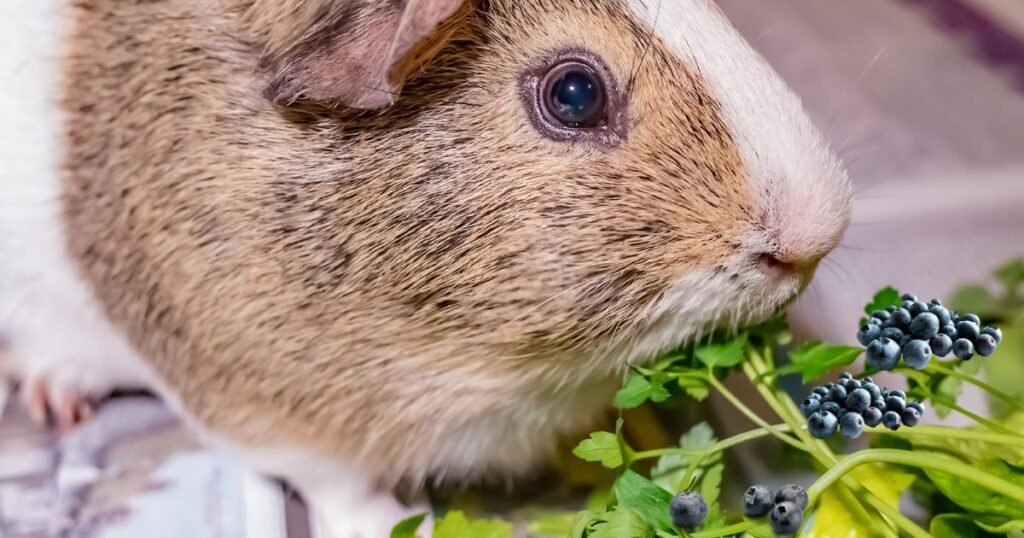
Blueberries do come with some risks if fed irresponsibly. Here are the potential downsides to watch out for:
High in Natural Sugars
While the sugar in blueberries is natural fructose, it can still pose problems if overfed:
- Fifteen grams of sugar are included in one cup of blueberries. This is a lot for a tiny guinea pig.
- Sugar consumption in excess may cause fatty liver disease, diabetes, and obesity.
- The sugar content makes blueberries more of a dessert than a nutritious food.
Blueberries should be limited to a few times per week as a treat to avoid issues. They are too high in sugar to be a daily fruit.
Acidity May Cause Stomach Upset
With a pH of around 2.7, blueberries are pretty acidic compared to other guinea pig foods:
- Guinea pigs have sensitive digestive systems prone to upset.
- Acidity may cause temporary diarrhea until their gut adjusts.
- Some guinea pigs may refuse blueberries if the edge bothers them.
Consider mixing probiotics or baking the blueberries into an oat treat to reduce acidity.
Read More: Can Guinea Pigs Eat Blueberries?
Small Size Increases Choking Risk
Since blueberries are tiny, they can easily get lodged in guinea pigs’ throats:
- Guinea pigs have small airways that blueberries may obstruct.
- Constantly monitor your pig while eating to watch for coughing or choking.
- Chop larger berries into small pieces to reduce this hazard.
Choking is unlikely with proper supervision, but the risk exists due to their size.
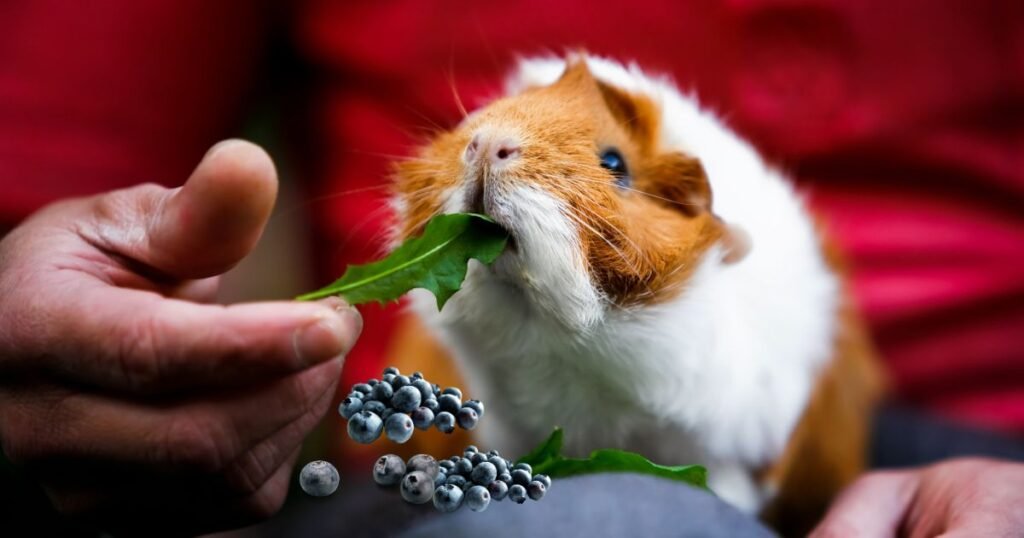
High Oxalate Content
Like spinach and beet greens, blueberries have moderately high oxalates. In large amounts, this can potentially cause bladder stones:
- Oxalates bind to calcium and can crystallize into bladder stones.
- Offering a variety of fruits and veggies balances out oxalates.
- Staying hydrated and feeding Timothy hay minimizes stone risk.
While a genuine concern for consistently high oxalate diets, occasional blueberries are unlikely to cause problems alone.
As with any fruit or veggie, following basic feeding guidelines will allow your guinea pig to enjoy blueberries safely. The health benefits outweigh the minor risks. In moderation, blueberries make a nutritious supplement to your cavy’s regular diet. Just be sure to introduce them slowly and keep portions reasonable.
Conclusion
In conclusion, guinea pigs can eat blueberries as a healthy and nutritious treat. But eating them in moderation and as part of a healthy, diverse diet is essential. Feeding your guinea pig too many blueberries can lead to health problems, so keeping their portion size in check is necessary.
Blueberries are a fantastic source of fiber, antioxidants, and vitamins, which might give your pet some health advantages. They can help prevent cell damage, promote healthy digestion, and hydrate your guinea pig.
When feeding blueberries to your guinea pig, wash them thoroughly, cut them into small pieces, and provide them at room temperature. Also, remember to feed your guinea pig other fruits and vegetables as part of their diet.
In summary, blueberries can be a healthy and tasty treat for your guinea pig, but feeding them in moderation and as part of a varied diet is crucial. Knowing what meals are acceptable for your pet and what foods to avoid is essential for being a good pet owner. Your guinea pig may live a long and healthy life with the proper care and nutritious food.
FAQs about Can Guinea Pigs Eat Blueberries
How many blueberries can I feed my guinea pig?
You can feed a few blueberries (2-3) to your guinea pig once or twice a week as a treat.
Can I feed my guinea pig frozen blueberries?
You can feed your guinea pig frozen blueberries, but thaw them entirely and serve them at room temperature.
Are blueberries safe for baby guinea pigs?
It is best to wait until your guinea pig is six months old before introducing blueberries or other new food into their diet.
Can blueberries cause diarrhea in guinea pigs?
Feeding your guinea pig too many blueberries can lead to digestive problems, including diarrhea. Therefore, it is crucial to provide them in moderation.
